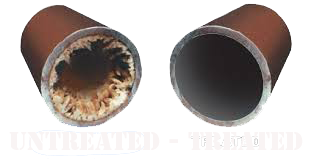Identifying and Treating Hard Water

Hard water is one of the most persistent and annoying plumbing problems that you can face. It’s something that can seemingly appear out of nowhere and start producing adverse effects in your everyday life. Hard water is essentially characterized by water that has absorbed too many outside minerals including calcium, magnesium, and some sulfates. The problems are numerous and it can become so widespread that you might feel as if you need to contact an emergency plumber. If you let hard water go unchecked, you might have to get a plumber on your case.
That is largely because hard water can have such wide ranging effects on many different things throughout the house. Indeed, it can produce lime scale deposits on your dishes, in your pipes, and even in your water heater. This can lead to some relatively catastrophic water heater breakdowns or even some bursting pipes. At that point you will definitely need to get in contact with a plumber. More commonly, however, the lime scale deposits will reduce the lifespan of toilets, dishwashers, and other appliances throughout the home.
But, hard water can also affect your own ability to get clean. The additives in the water tend to create situations in which soap won’t lather properly. This applies body soap, shampoo, dish soap, and even laundry detergent. So, it takes about twice as much soap to carry out the same jobs. Before it becomes necessary to contact an emergency plumber, you might want to notice some of the signs of water hardness.
The most obvious way to check for hard water is by running a “lather” test. If you have to put an abundance of dish soap in the water to create an adequate lather, then you might have hard water. But, green deposits on pipes and at the faucet mouths can also be good indicators of hard water. The minerals in the water will have altered the color of the pipes or faucets. You’ll also notice a major increase in soap scum that is virtually impossible to remove. This unsightly contaminant will find its way onto virtually every surface that uses the water in the house. For instance, the bathtub, the washing machine, and the dishwasher will all start to exhibit signs of soap scum.
Of course, dealing with hard water doesn’t have to mean contacting an emergency plumber. When you notice the first signs of hard water, it’s a good idea to invest in a water softening system. Most water softening options basically use salt to perform an ion exchange with the chemicals in the water. The sodium chloride (salt) disrupts the patterns of excessive mineral concentrations making the water “softer” in the long run. Other options include natural or artificial zeolites that can effectively help change the chemical composition of the water.


I always check the customers kettle and ask them do they get a lot of lime scale build up in there. It’s part of the building regs/ benchmark to assess weather the installation is in a hard water area, if so you are required to install a lime scale reducer valve on the in coming water main. 🙂